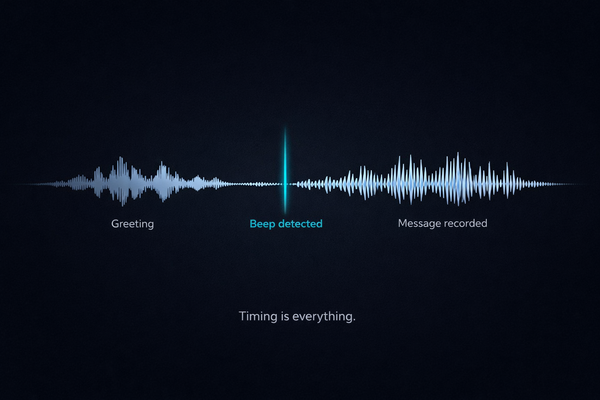[AI] From Software to Outcomes: Dan Elkaim on Building Vertical AI SDR Agents at Topo
![[AI] From Software to Outcomes: Dan Elkaim on Building Vertical AI SDR Agents at Topo](/content/images/size/w1200/2025/07/AI-Agents-Replace-50--staff.png)
The transition from traditional SaaS to agentic AI represents more than just technological evolution—it's a fundamental shift in how businesses deliver value. Dan Elkaim, CEO and co-founder of Topo, exemplifies this transformation through his journey from sales leadership to building custom AI agents that execute sophisticated outbound campaigns at scale.
In this episode of Anyreach Roundtable, Richard Lin speaks with Dan Elkaim, CEO of Topo, a Y Combinator-backed AI SDR platform. They explore the practical realities of agentic AI implementation, the importance of vertical specialization over horizontal expansion, and the critical role of human-in-the-loop systems. Dan shares insights from his decade-long go-to-market journey and the strategic pivot that led to Topo's current success serving enterprise clients with custom AI agents.
Key Takeaways
• The Paradigm Shift to Outcomes – Agentic AI transforms the value proposition from selling productivity tools to selling task execution itself, replacing both software and labor costs.
• Vertical Focus Over Horizontal Expansion – Success in AI agents requires deep specialization rather than broad feature expansion across multiple job functions.
• Human-in-the-Loop Necessity – Current AI capabilities operate at level three autonomy, requiring strategic human oversight rather than complete replacement.
• Custom Agents for Scale – Generic solutions fail to deliver ROI; successful implementations require custom training and deep integration for each client.
• Defensive Positioning Through Data – Competitive advantage comes from unique data collection and vertical expertise, not just model improvements.
The Evolution from SaaS to Agentic
Dan's perspective on agentic AI stems from his extensive background in go-to-market roles across the technology stack. Having spent a decade in positions ranging from SDR to head of sales, he brings a practitioner's understanding to AI implementation.
This fundamental shift represents more than technological advancement. Traditional SaaS companies sell hammers; agentic AI companies deliver the finished house. The implications extend beyond product development to pricing models, customer expectations, and competitive dynamics.
Dan's experience at Aircall, where he led sales teams through growth from 10 to 100 million in annual revenue, provided crucial insights into enterprise sales operations. This background informed Topo's approach to building AI agents that integrate seamlessly with existing sales processes rather than disrupting them entirely.
The Y Combinator Pivot Journey
Topo's current focus on AI SDR agents emerged through a strategic pivot during their Y Combinator batch. Originally, the team pursued a digital sales room concept—a shared collaboration space for complex B2B sales cycles.
The pivot decision, made in January 2024, reflected both market timing and team capabilities. Rather than force product-market fit in a crowded collaboration space, the team recognized their unique positioning at the intersection of outbound expertise and AI capabilities.
This strategic flexibility demonstrates the importance of founder-market fit over initial product concepts. Dan's go-to-market expertise, combined with his co-founders' technical and outbound specializations, created natural advantages in the AI SDR space that weren't present in their original concept.
The Three Critical Problems with Generic AI SDR Solutions
Through market analysis, Dan identified three fundamental problems with existing AI SDR solutions that informed Topo's differentiated approach:
Generic Platform Limitations Most solutions offer identical capabilities regardless of industry, product type, or target audience. This one-size-fits-all approach fails to capture the nuanced requirements of different sales environments.
Overemphasis on Messaging Over Targeting The industry focuses heavily on ChatGPT-powered personalization while neglecting the more crucial challenge of identifying the right prospects at the right moment with appropriate context.
Unrealistic Expectations Management Companies often provide advanced AI tools to organizations lacking the strategic foundation to utilize them effectively, creating a mismatch between capability and readiness.
These insights shaped Topo's approach of combining custom AI agents with strategic human guidance, ensuring clients can effectively leverage advanced automation capabilities.
The Architecture of Custom AI Agents
Topo's solution centers on building bespoke outbound engines designed specifically for each client. This approach requires significant upfront investment but delivers superior performance compared to generic alternatives.
Deep CRM Integration Rather than attempting to replace existing systems, Topo integrates directly with Salesforce, HubSpot, and other established CRM platforms. This approach minimizes disruption while maximizing automation benefits within familiar workflows.
Contextual Data Collection The platform excels at gathering not just contact information but relevant business context that enables more effective outreach timing and messaging.
Strategic Human Partnership Each implementation includes dedicated human strategists who work with clients to develop targeting approaches, iterate on messaging, and optimize campaign performance over time.
This combination of custom AI development with human strategic guidance addresses the gap between technological capability and practical implementation that many competitors overlook.
The Case Against Horizontal Expansion
One of Dan's strongest convictions involves maintaining vertical focus rather than expanding across multiple job functions. This position contrasts with many competitors who quickly move from SDR agents to marketing, customer success, and other roles.
This philosophy reflects several strategic considerations:
Complexity Depth Requirements Achieving elite performance in any sales role requires deep understanding of industry dynamics, buyer psychology, and process optimization that cannot be easily replicated across functions.
Performance Standards Sales roles involve clear, measurable outcomes that expose AI limitations more readily than other functions, making excellence non-negotiable for market acceptance.
Competitive Differentiation While competitors spread resources across multiple use cases, concentrated focus enables Topo to build superior capabilities in their chosen vertical.
The approach parallels successful enterprise software companies that achieve market leadership through deep specialization rather than broad feature sets.
Managing Expectations in the Agentic Era
Dan's perspective on current AI capabilities reflects practical experience with both technological possibilities and market realities. He references Sam Altman's five-level AGI framework to contextualize current agent capabilities.
This measured approach contrasts with industry messaging around complete human replacement. Current AI operates at level three autonomy—capable of executing complex tasks but requiring human oversight for strategic decisions and quality assurance.
The implication extends beyond individual implementations to industry dynamics. Companies that promise complete automation often face retention challenges when reality doesn't match expectations, while those that position AI as human augmentation build sustainable client relationships.
Integration Strategy in Enterprise Environments
Enterprise adoption of agentic AI faces significant challenges around existing tool integration and change management. Dan's approach prioritizes working within established systems rather than requiring wholesale platform changes.
CRM-Centric Architecture Topo builds deep integrations with existing CRM systems rather than attempting to replace them with "headless" AI-managed alternatives. This approach recognizes that CRMs serve as system of record for business processes that extend far beyond sales automation.
Gradual Implementation Paths Rather than requiring immediate organizational transformation, Topo's implementation approach allows companies to maintain existing workflows while gradually incorporating AI capabilities.
Future-Proofing Considerations While acknowledging that agent-building tools will become more accessible, Dan positions Topo's value in the depth of vertical expertise and integration sophistication rather than basic technical capability.
This strategy acknowledges the evolution toward easier agent development while establishing defensible positioning through specialized expertise.
Internal AI Operations and Team Efficiency
As CEO of an AI company, Dan implements aggressive internal automation to maintain operational efficiency with a lean team. Topo's approach demonstrates how AI-native companies can achieve high revenue-per-employee ratios while maintaining quality standards.
Automated Customer Intelligence The team uses conversational intelligence tools to extract insights from client calls, generating content ideas and gathering context for agent customization without dedicated marketing or onboarding staff.
Strategic Human Allocation Rather than eliminating human roles entirely, the company focuses AI on routine tasks while preserving human involvement in strategic and creative functions.
Scale Expectations Dan projects that companies achieving current revenue levels would traditionally require significantly larger teams, with AI enabling 50% staff reduction while maintaining growth velocity.
This internal implementation serves as proof-of-concept for client applications while demonstrating sustainable business model advantages.
Competitive Intelligence and Product Development
Dan's team implements sophisticated competitive monitoring to inform product development and strategic positioning. This approach demonstrates how AI can enhance traditional business intelligence gathering.
Their system monitors competitor communications across social platforms, Discord, Reddit, and other channels to identify feature requests, customer complaints, and strategic directions. This intelligence feeds directly into product planning and development cycles.
The integration extends to automated development processes, with competitive insights informing feature specifications that get processed through AI coding platforms for rapid implementation. While still evolving, this approach points toward future competitive advantages through AI-accelerated development cycles.
The Future Landscape: Consolidation and Vertical Focus
Dan predicts significant industry consolidation over the next three to five years as market dynamics favor vertical specialization over horizontal platform approaches.
Technology Commoditization As agent-building tools become more accessible, basic implementation capabilities will lose competitive value, favoring companies with deep vertical expertise and proprietary data advantages.
Market Maturation Current overstimation of immediate AI impact will give way to understimation of long-term transformation, creating opportunities for companies that balance realistic near-term expectations with aggressive long-term vision.
Venture Capital Evolution AI-native companies require less capital to achieve significant scale, enabling both profitability and growth simultaneously while achieving higher revenue-per-employee ratios than traditional software companies.
This perspective informs Topo's strategy of building sustainable competitive advantages through data collection and vertical expertise rather than relying solely on technological capabilities.
Building Defensible AI Companies
Dan's thesis on building lasting AI companies centers on vertical specialization and unique data collection rather than model improvements or horizontal expansion.
Data as Competitive Moat While competitors can access the same base models, unique data collection and curation create sustainable advantages that compound over time.
Vertical Expertise Depth Deep understanding of specific industry dynamics, buyer behaviors, and process requirements cannot be easily replicated by horizontal platforms.
Focus as Strategic Advantage Concentrated resource allocation enables superior capabilities in chosen markets while competitors spread efforts across multiple use cases.
The approach reflects lessons from successful enterprise software companies that achieved market leadership through specialization rather than broad feature coverage.
Implementation Excellence Over Cost Competition
Topo's pricing and service model reflects a philosophy of sustainable value creation rather than short-term market capture through low-cost approaches.
The company focuses on implementation quality and ongoing optimization rather than competing primarily on initial setup costs. This approach builds client relationships based on performance outcomes rather than price sensitivity.
Custom Development Investment Each client implementation requires significant customization, creating higher initial costs but superior long-term performance and retention.
Strategic Partnership Model Rather than transactional tool provision, Topo builds ongoing strategic partnerships that evolve with client needs and market conditions.
Performance-Based Value Proposition Success measurement focuses on sales outcomes and efficiency improvements rather than feature utilization or cost reduction alone.
Conclusion
Dan Elkaim's journey from traditional sales leadership to AI agent development illustrates the importance of combining deep domain expertise with realistic technology assessment. His success with Topo demonstrates that effective AI implementation requires more than technical sophistication—it demands understanding of business operations, customer psychology, and sustainable value creation.
The future of AI in sales lies not in complete human replacement but in intelligent augmentation that amplifies human strategic capabilities while automating routine execution. Companies that embrace this hybrid approach while building deep vertical expertise and robust integration capabilities will capture the greatest value from AI transformation.
As the industry matures beyond initial hype cycles, competitive advantage will shift from basic AI implementation to comprehensive business understanding and strategic execution excellence. Dan's vertical focus and custom implementation approach positions Topo well for this evolution, building sustainable partnerships while the market consolidates around proven value delivery.
The path forward requires balancing ambitious technological vision with pragmatic implementation strategies—exactly the combination that successful AI-native companies like Topo are demonstrating in practice.
How to connect with Dan from Topo
Keywords: AI SDR agents, agentic AI, vertical AI specialization, sales automation, custom AI agents, outbound sales, enterprise AI implementation, Y Combinator




![[AI Digest] Agents Coordinate Plan Deploy Scale](/content/images/size/w600/2025/07/Daily-AI-Digest.png)